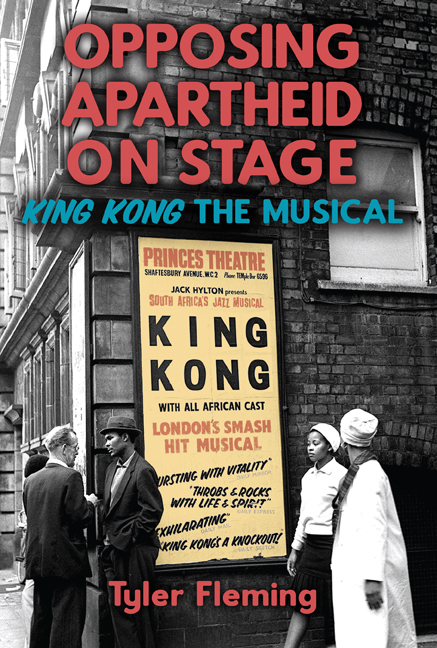Book contents
- Frontmatter
- Dedication
- Contents
- Acknowledgments
- Introduction
- 1 “Marvelous Muscles”: A History of Ezekiel Dlamini, the Real King Kong
- 2 Creating a “Back of the Moon”: The Union of Southern African Artists and Interracial Collaboration behind the “All-African” Musical
- 3 “Quickly in Love”: Popular Reception of the 1959 King Kong and Entertaining the Possibilities of a Different South Africa(s)
- 4 “Kwela Kong”: The Trials and Tribulations of a South African Musical Abroad in 1961
- 5 “Sad Times, Bad Times”: Issues of Exile, the King Kong Cast, and South African Jazz in Britain, 1961–1980
- 6 “The Boy's [and Girl’s] Doin’ It”: Moving to America and Rediscovering Africa, 1960–1989
- 7 “Death Song”: The 1979 Remake of King Kong and the Power of Cultural Memories under Apartheid
- Notes
- Bibliography
- Index
- Rochester Studies in African History and the Diaspora
1 - “Marvelous Muscles”: A History of Ezekiel Dlamini, the Real King Kong
Published online by Cambridge University Press: 06 October 2020
- Frontmatter
- Dedication
- Contents
- Acknowledgments
- Introduction
- 1 “Marvelous Muscles”: A History of Ezekiel Dlamini, the Real King Kong
- 2 Creating a “Back of the Moon”: The Union of Southern African Artists and Interracial Collaboration behind the “All-African” Musical
- 3 “Quickly in Love”: Popular Reception of the 1959 King Kong and Entertaining the Possibilities of a Different South Africa(s)
- 4 “Kwela Kong”: The Trials and Tribulations of a South African Musical Abroad in 1961
- 5 “Sad Times, Bad Times”: Issues of Exile, the King Kong Cast, and South African Jazz in Britain, 1961–1980
- 6 “The Boy's [and Girl’s] Doin’ It”: Moving to America and Rediscovering Africa, 1960–1989
- 7 “Death Song”: The 1979 Remake of King Kong and the Power of Cultural Memories under Apartheid
- Notes
- Bibliography
- Index
- Rochester Studies in African History and the Diaspora
Summary
Before the Union of Southern African Artists could undertake an all- African jazz opera, the organization had to find a topic that would interest audiences, could be told musically, and be apolitical enough so as to not alienate any segment of the audience and the apartheid regime. In 1957, the USAA found such a topic: the rise and fall of Ezekiel “King Kong” Dlamini, a wildly popular Zulu heavyweight boxer who fell from grace after murdering his girlfriend and subsequently taking his own life. Dlamini's life story had become township lore, and the USAA sought to tap into the local legend's allure with the musical.
Since Dlamini's boxing career made him local folk hero, it is vital to understand the sport's place within South African society throughout the 1940s and 1950s in order to contextualize the musical. This chapter examines the culture of black boxing in South Africa throughout this era while also providing a detailed biography of Dlamini, the inspiration for the musical. The biographical analysis demonstrates the tumultuous nature of his life, separates the facts from the King Kong myth that emerged through gossip and popular histories, and explores how his transformation from a mediocre heavyweight into an unbeatable legend and township hero shaped popular knowledge of the man. Dlamini's life story shows how and why the story of a Zulu heavyweightturned- murderer became the basis for a successful jazz opera that captured the collective imagination of South Africans across political, cultural, and racial lines.
The Place of Black Boxing on the Rand
During the 1940s and 1950s, organized boxing took off throughout the Witwatersrand's townships, locations, and “black spots.” Boxing clubs and gyms, typically featuring makeshift equipment, sprouted in Sophiatown, Alexandra, Pimville, Orlando, and other black residential spaces throughout the Reef. Cutting across class and educational lines, boxing gyms could be found in hostels, youth clubs, community centers, and even the black bourgeois stronghold of the Bantu Men’s Social Centre (BMSC). The sport's growth around black Johannesburg paralleled the growth of the city's African population as more and more migrants came from the countryside seeking employment.
- Type
- Chapter
- Information
- Opposing Apartheid on StageKing Kong the Musical, pp. 20 - 48Publisher: Boydell & BrewerPrint publication year: 2020



